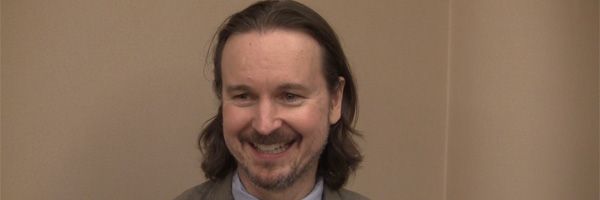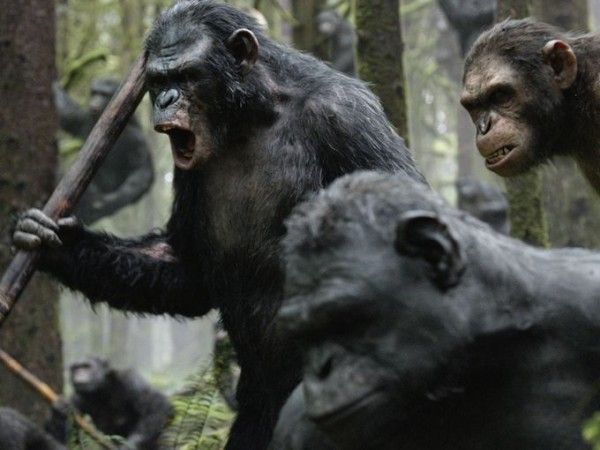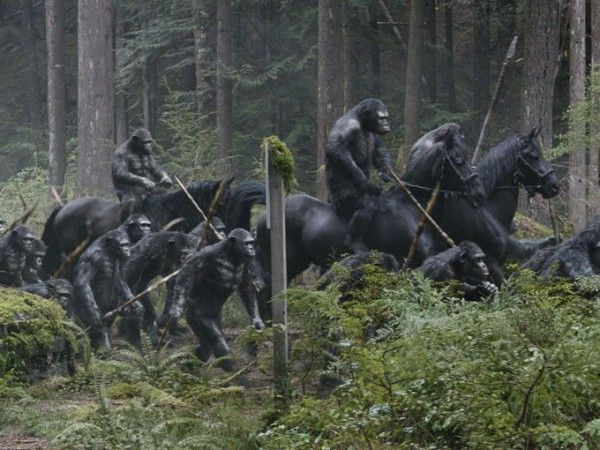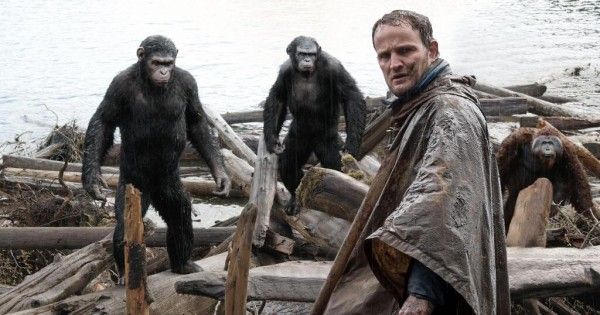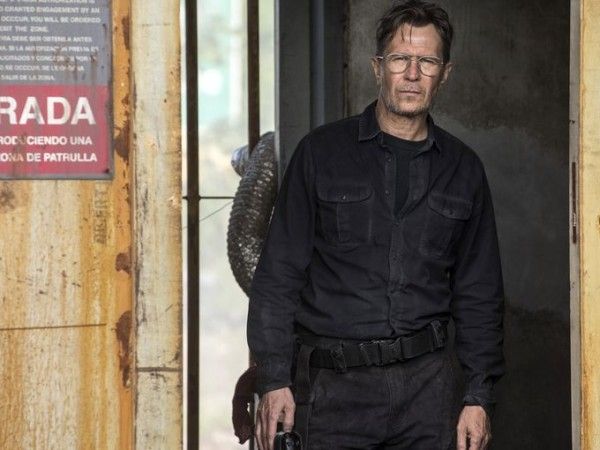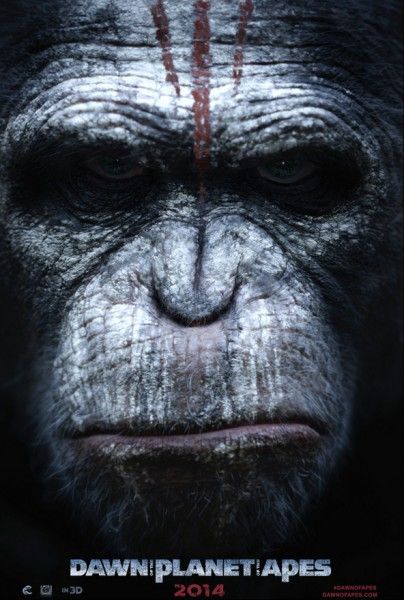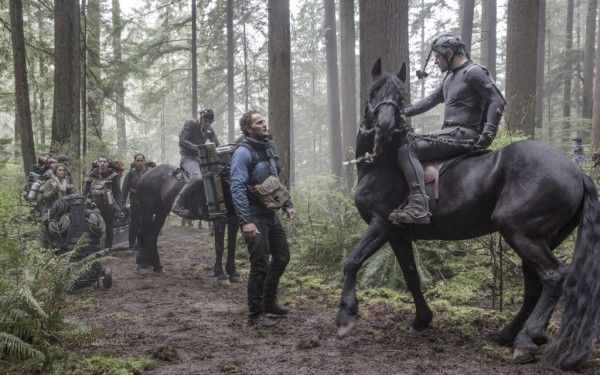Over the past few weeks, we've posted an enormous amount of coverage on director Matt Reeves' Dawn of the Planet of the Apes. We had our set visit (with 45 things to know about the movie), on set interviews with Andy Serkis, Jason Clarke, and cinematographer Michael Seresin, new toy images, new movie images and posters, a TV spot, and more. Based on everything I've seen and learned, Dawn of the Planet of the Apes is going to be a great sequel to Rise of the Planet of the Apes and it's going to show how motion capture technology has advanced over the past few years. I really believe Reeves is going to hit a home-run with this film.
At WonderCon, I landed a great video interview with Reeves. He talked about the film's concept of shying away from traditional villains, directing while he had pneumonia, whether or not James Franco is in the movie, future sequels, if the next sequel could have a shorter title, what he learned from friends-and-family screenings and the challenge of having people watch the film when it's not close to done, and a lot more. Hit the jump for the video and full transcript.
Here's the video followed by a full transcript since the audio in the room was a bit loud.
Matt Reeves:
- Talks about the footage they showed.
- How neither side is the villain.
- Directing while you have pneumonia.
- Is James Franco in the movie or not?
- Easter eggs and planting seeds for the 3rd film.
- Will the 3rd film have a shorter title?
- Is the 3rd film going to be the one that connects to the original movies or are there more stories to tell?
- What did they learn from friends and family screenings?
Collider: What did you actually show the folks at WonderCon? I saw some footage at Fox the other day, like five clips, and a whole bunch of stuff from CinemaCon. Basically everything looks great, but what did you show today?
MATT REEVES: Were you at the CinemaCon screening?
Yes.
REEVES: We showed the same thing that we showed at CinemaCon. So we showed essentially what was a trailer of some unfinished shots, but a lot of finished shots, and then a sort of extended version of a particular scene, that scene with Koba. That's what we showed, and then you saw actually quite a bit more at Fox the other day.
Yeah, I saw a bunch of clips.
REEVES: What did you think about the clips? You can be honest.
Everything I know about this movie sounds fantastic, let's just jump into it. One of the things I think is very cool about the film is how you are showing the ape's side and the human side, how each side is making valid points and it's not like either side is a villain. They're dealing with real life, real word stuff.
REEVES: The concept of the film was to not have any villains and we would start in a world that was completely ape immersive. Essentially we start in a prologue that takes us up to where we are and what happened since the last film, and as far as the apes know and as far as we know the humans may be gone. Of course, unless you’ve seen the trailer, in which case you know that Gary Oldman and Jason Clarke and Keri Russell and Kodi Smit-McPhee are in the movie, but the idea is that you see the apes and what they have created. A world in which they have begun to evolve and it seems as if they have inherited the earth, and just around the time you're wondering where that story is going to go, the humans show up and you realize that this is the story of two families, of a human family and of an ape family and the question of coexistence. We all know that Planet of the Apes is not "Planet of the Humans and Apes", but this is that moment in time where it could have been, which I thought was a story we hadn't really seen in the whole canon and I thought that was an exciting idea. The idea is that there are no villains in that story because everybody arrives at their point of view from completely valid perspectives, which is their life experience.
I'm very curious if you could talk about directing while you have pneumonia [laughs]?
REEVES: Directing while you have pneumonia is a little tiring and you start getting kind of short of breath, at a certain point you start feeling feverish and somebody suggests that you see a doctor. They come to the set and say, "You need to stop shooting today because you have pneumonia", which is pretty much what happened.
Do a lot of people realize that you were directing with pneumonia or is it still on the down low?
REEVES: No I think people- but certainly the actors and the crew knew that I got pneumonia. I mean, we ended up having to shut down for a little bit. We started shooting in very difficult circumstances in Vancouver. It was freezing and it was raining and we were shooting in a lot of different environments, which were challenging. Then we ended up shooting actually in some challenging environments in New Orleans, and by the time all that happened I guess somehow my immune system got so compromised that I got pneumonia, and had it for a little while before I started really slowing down and thought, "Maybe we should look at this," and it turned out that way.
There's a lot of conjecture online and it recently came out, and believe me I'm against spoilers but I'm definitely curious - James Franco recently has been wondering, and people have been wondering, if he's in the movie. I know that they shot something with him in the last film that was never used, so is there a sort of cameo to his character?
REEVES: There is an appearance that he makes which is not about some ending that they - there's no reprise of the footage that they shot of his death or anything like that. Essentially the idea is that Caesar has ties to both communities, to the humans because he has a human father in Will, who died in the viral apocalypse, and then he has the apes who are his family now, so of course he has ties to both. We felt this movie is so much about his emotional perspective that in order to set that into a framework you needed to refer to essentially his father. So, in a way that I won't totally give away, we essentially have a moment where you have Caesar sort of reminiscing or connecting to who Will was and what he meant to hm.
I hate talking bout another sequel on top of this one, but everything I've seen on this looks great. I know the studio really believes in it because they’ve talked about you doing the third one.
REEVES: Right.
Once you have that information how much does that possibly alter or influence maybe an Easter egg or two, or maybe additional photography where you're like, "We should definitely plant another seed here"?
REEVES: You know it didn’t influence additional photography, but I will say that even as we were doing the story in the beginning stages, but also as we were shooting it, you start discovering certain things along the way that you feel really excited about. There's a lot in this movie that has come to life in a way where you feel like, "This is a vein we have to continue in some way." So there are lots of threads that will project in to the future. In that sense I was kind of thinking about another one regardless of whether or not there would ever be another one, only because this is an ongoing story and the idea is that there is the original Planet of the Apes and then there's Rise, and the idea was that basically Rise is the beginning that goes to an ending we already know, and it’s the journey in there that’s interesting. So knowing that that’s where it goes to, you get lots of ideas about how we could get there that might tell you more about who the characters are.
The first one is called Rise of the Planet of the Apes, this one is Dawn of the Planet of the Apes, at any point is someone saying "Jesus, these are long titles. Can we cut these?"
REEVES: I think that's already happened. I think people are saying these are long titles. They are long titles.
Are you already thinking that if you get to do a third "We need to come up with like 'Apes Revenge'," or some two word title.
REEVES: [Laughs] I haven't been thinking primarily about the title. I think at least the one thing about "Planet of the Apes" is that that’s something that is beloved to fans of the franchise, so having that as part of the title is probably a good idea, but maybe as it continues it could simplify, I really don’t know.
I spoke to Andy recently and he said the goal might be for the third film to be the connection to the original movies. Do you think that’s an accurate thing, or do you think there's still more story to be explored?
REEVES: I think there may be more story even before that to be honest with you. Its kind of an epic story, it has a big sweep, and the idea of - how do you get from Caesar and what his world is about to that world? That’s a long distance, so I think there's a lot of- he becomes kind of a mythic character, I think, in the cannon of the story and even by the end of this film. I think that the way that future generations that come from him and all of that could be told in a way that - because what I really wanted with this film was to make sure that we didn’t get too quickly to - when I first got involved they proposed an outline that had them talking much more like they do in the later film and all this stuff was far more advanced and closer to the way things are in Planet of the Apes. And I was like, "Wait a minute, we just came from Rise and the delicious thing about Rise was watching the beginning, and I think that there's more to that beginning. We should take a jump, but we should take the next step. We should watch as this evolution takes place." So for that evolution to get to that place there's a lot of story.
Have you tested the movie for friends or family or any test screenings?
REEVES: Sure.
What have you learned form these screenings that have possibly impacted how you altered the movie, if at all?
REEVES: Well I think what you learn is, any time you show a movie, you learn sort of what seems clear and what doesn’t seem clear. This is a very complicated story, so you have an instinct of what the story should be and it's almost like checking your math. You put it in front of an audience and you see, "Oh good, that is working the way I thought." And there's some things you go, "That’s not what I thought." And then you work on those things to try and improve them. I couldn’t really tell you specifics, I just think its always important to show a movie.
What's particularly challenging about this movie is what you're asking them to look at, and actually even still what we have is bizarre, because it is essentially most of the cast who are apes are wearing mocap equipment - they have dots on the their faces, they're wearing these kind of grey leotard and a camera on their head, and you have to sort of suspend disbelief enough as an audience to go, "Okay, imagine those are apes. Imagine these human beings are interacting with them in this specific way." In that sense its asking an audience to take a huge leap. So the crazy thing about it is that because of the emotional commitment of those actors who play the apes, because of Andy, you watch the movie and you actually do get in the movie, but its such a strange experience because you're not actually seeing apes. It's a weird thing to ask an audience to do.
I cannot wait to see the finished film, thank you so much for your time.
REEVES: My pleasure.

